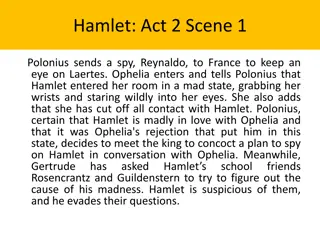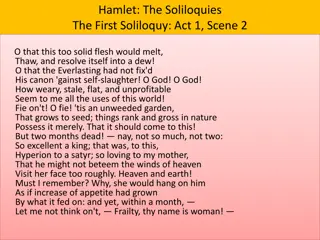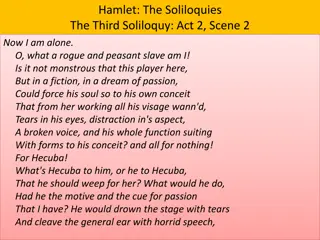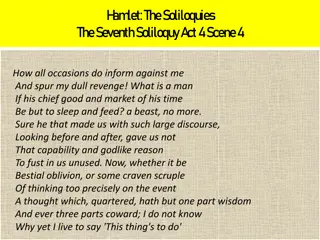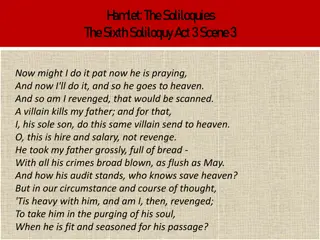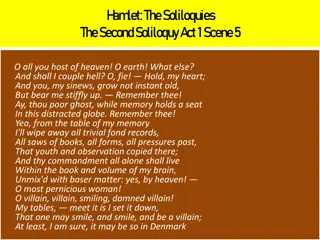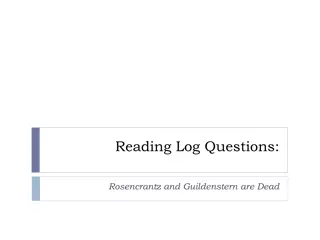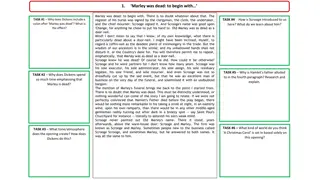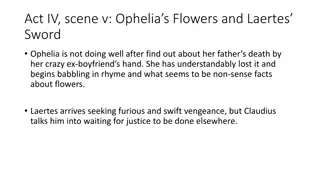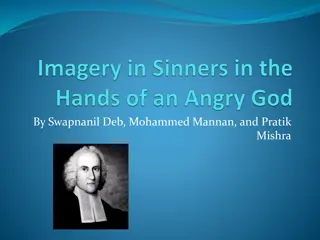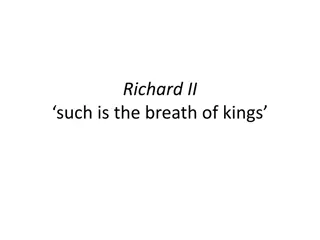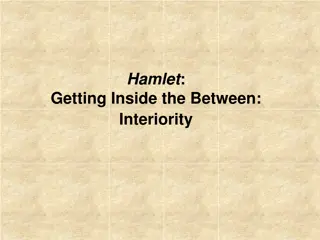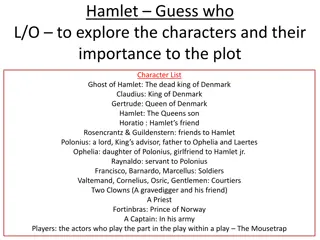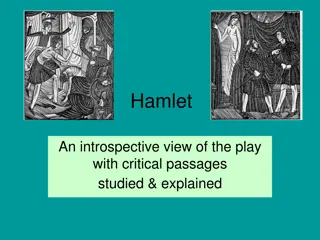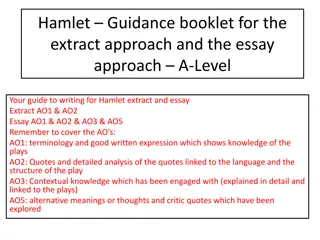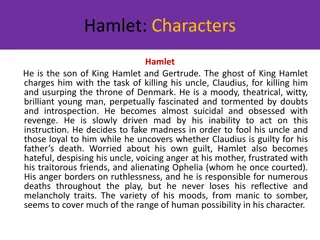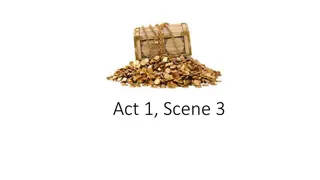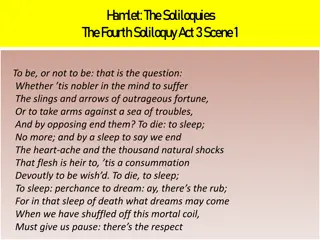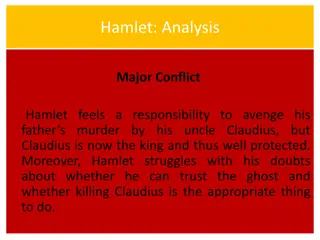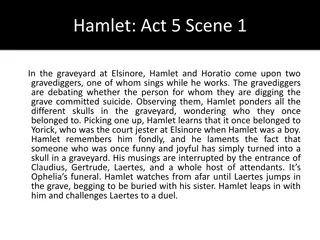Intriguing Developments in Shakespeare's "Hamlet" Act Two
Polonius sends a spy to France, Ophelia recounts Hamlet's erratic behavior, and Hamlet plans to expose King Claudius's guilt through a play. Key plot points established include Hamlet's supposed madness due to unrequited love, the arrival of his friends Rosencrantz and Guildenstern, and the actors'
0 views • 4 slides
Analysis of Hamlet's First Soliloquy in Act 1, Scene 2
The first soliloquy in Shakespeare's "Hamlet" captures the protagonist's deep melancholy and internal turmoil following his father's death and his mother's hasty marriage to his uncle. Hamlet expresses suicidal thoughts, seeing life as futile and the world as a corrupted place. This soliloquy sets t
0 views • 7 slides
Character Description of Chulak from "The Firework Maker's Daughter
Tasked with writing a character description of Chulak from "The Firework Maker's Daughter," the provided quotes and information reveal Chulak as a young boy who works as an animal keeper for the King. He is cheeky, good friends with Lila, and shares a secret about a talking elephant named Hamlet. De
6 views • 8 slides
Hamlet: The Third Soliloquy from Act 2, Scene 2
Hamlet contemplates his own indecision and lack of action in seeking revenge for his father's murder. He questions the player's ability to feel deeply for a fictional character and expresses his frustration at his own inaction. Through introspection, he resolves to use a play to uncover the truth an
0 views • 10 slides
Hamlet's Seventh Soliloquy: Reflections on Revenge and Inaction
Prince Hamlet reflects on the nature of revenge, his own inaction, and the contrast between his hesitation and the willingness of soldiers to die for trivial causes, ultimately resolving to be resolute and decisive in seeking retribution.
1 views • 9 slides
Analysis of Hamlet's Sixth Soliloquy in Act 3, Scene 3
Hamlet's Sixth Soliloquy in Act 3, Scene 3 delves into his inner turmoil as he contemplates seeking revenge on Claudius for his father's murder. Despite having the perfect opportunity to kill Claudius while he prays, Hamlet hesitates, questioning whether sending him to heaven would truly be an act o
0 views • 7 slides
Analysis of Laertes' Attitudes in Shakespeare's Hamlet Extract
In this analysis of an extract from Shakespeare's Hamlet, we explore how Laertes' attitudes towards Ophelia and Prince Hamlet are presented. Laertes is depicted as controlling and disapproving of their relationship, viewing it as trivial and immature. Through close examination of language and imager
1 views • 15 slides
Understanding Soliloquy and Dramatic Monologue in Literature
A soliloquy is a form of monologue where a character speaks to themselves, the audience, or a surrogate, revealing inner thoughts. This presentation explores different types of soliloquies and their significance in literary works, including examples from Shakespeare's Hamlet. Additionally, it delves
0 views • 9 slides
Hamlet's Second Soliloquy: The Revelation and Vow for Revenge
Hamlet's second soliloquy in Act 1, Scene 5, follows the shocking revelation from his father's ghost that Claudius is the true murderer. Filled with grief and anger, Hamlet vows to avenge his father's death, referring to his mother as a "pernicious woman" and his uncle as a "smiling damned villain."
0 views • 5 slides
Insights from Critics on Hamlet's Character and Themes
Various critics provide intriguing perspectives on Hamlet's character and the themes within the play. Swinburne emphasizes Hamlet's inner nature as a conflux of forces, while Samuel Johnson views Hamlet more as an instrument than an agent. Von Goethe discusses the challenges faced by Hamlet in fulfi
0 views • 22 slides
Exploring Masculinity in Shakespeare's Works
The exploration of masculinity in Shakespeare's works, particularly through characters like Othello and Hamlet, delves into complex themes of race, gender norms, and identity construction. The construct of masculinity as an achieved status rather than a biological given is analyzed, highlighting the
0 views • 24 slides
Exploring Themes and Analysis in Rosencrantz and Guildenstern are Dead
In "Rosencrantz and Guildenstern are Dead," various literary devices such as irony, verbal humor, and syllogisms are utilized to convey the complex themes of fate, identity, and the nature of reality. The characters of Rosencrantz and Guildenstern are explored with a spotlight on their distinguishin
1 views • 20 slides
Top Quotes from Shakespeare's Hamlet
Explore some of the most memorable quotes from William Shakespeare's renowned tragedy, "Hamlet." This collection includes powerful and thought-provoking lines spoken by various characters throughout the play, reflecting themes of love, betrayal, madness, and existential ponderings. Each quote offers
0 views • 15 slides
Analyzing the Opening of 'A Christmas Carol' by Charles Dickens
In the opening paragraphs of "A Christmas Carol" by Charles Dickens, we are introduced to the character of Scrooge and the news of Marley's death. Dickens creates a somber and mysterious atmosphere, emphasizing Marley's death to set the stage for the supernatural events to come. We learn about Scroo
1 views • 18 slides
Tragic Events Unfold in Act IV of "Hamlet
Ophelia, reeling from her father's death, cryptically speaks about flowers, revealing underlying accusations. Laertes, manipulated by Claudius, seeks vengeance impulsively. Hamlet's unseen pirate adventure raises questions. Ophelia's demise in the brook signifies a tragic turn in the play.
2 views • 6 slides
Types of Imagery in Literature
Imagery is a powerful technique used by writers to create vivid mental images for readers. This article explores various types of imagery, including visual, tactile, olfactory, and gustatory imagery, with examples from famous works like "Sinners in the Hands of an Angry God," "A Streetcar Named Desi
0 views • 15 slides
Understanding Tone in Literature: An Analysis of Hamlet
Explore the concept of tone in literature through examples from Shakespeare's "Hamlet." Learn how tone influences the reader's emotional response and enhances understanding of a piece of writing. The analysis delves into Act One, Scene One to reveal the tension and tone Shakespeare sets up in the pl
0 views • 10 slides
The Skinhead Hamlet - Act 1, Scene 4
In Act 1, Scene 4 of "The Skinhead Hamlet," the Ghost reveals to Hamlet that he was murdered by Claudius, the current king of Denmark. The Ghost urges Hamlet to seek revenge for his untimely death, shedding light on the treachery that led to his demise. This snippet captures the intense and pivotal
0 views • 18 slides
Insights into Elizabethan Beliefs in Shakespeare's "Hamlet
Act 1, Scene 1 of "Hamlet" introduces characters and Elizabethan beliefs like ghostly encounters, the power of Latin to exorcise spirits, and the constraints of ghosts. Horatio's skepticism evolves, validating ghostly apparitions for the audience. The scene contrasts superstitions, hierarchy, and ed
0 views • 8 slides
Analysis of Staging the Spirit in Shakespearean Drama
Exploring the significance of staging spirits in Elizabethan drama, particularly in Hamlet, sheds light on how Shakespeare cleverly blended Protestant and Catholic viewpoints through characters like Horatio and the ghost. The meeting between Hamlet and his father's spirit marks a pivotal moment in t
0 views • 14 slides
The Intriguing World of Shakespearean Kings and Nobility
Explore the complexities of power, politics, and intrigue through famous quotes and character descriptions from Shakespeare's plays like Richard II, Hamlet, Edward II, A Midsummer Night's Dream. Dive into the themes of ambition, betrayal, and fate as portrayed through royal figures such as King Rich
0 views • 16 slides
Analysis of Act I Scene IV in Hamlet: Themes and Symbolism
Hamlet waits on the castle battlements for the ghost of the dead king to appear. Despite objections, he follows the ghost, setting a tone of nervous anticipation. The scene contrasts domestic and military settings, emphasizing urgency. The sound of cannon signals excessive drinking and partying at C
0 views • 15 slides
Exploring Hamlet's Interiority and Individual Identity
Delve into the complex themes of interiority, individual identity, and consciousness in Shakespeare's "Hamlet." Follow Hamlet's journey as he grapples with the idea of self, memory, and existence, challenging traditional notions of identity and embracing a modern sense of subjectivity. Analyze key s
0 views • 16 slides
Exploring Themes and Characters in Shakespeare's "Hamlet
Delve into the themes of revenge and tragedy in Shakespeare's "Hamlet" through an analysis of key scenes, characters, and language techniques. Explore the consequences of revenge, character motivations, and the atmospheric contrasts between scenes. Uncover the intricacies of the opening scenes, char
0 views • 52 slides
Analysis of Themes in "The Courtier" and Connections to Classical Works
Explore the themes of courtly grace, love, beauty, and human nature in "The Courtier" through connections to classical works such as Plato's "Ladder of Love" and Shakespeare's "Hamlet." Delve into the concept of sprezzatura and the progression towards virtue as seen in Bembo's writings. Consider the
0 views • 25 slides
Exploring Hamlet's Characters: Guess Who?
Delve into the characters of Shakespeare's "Hamlet" by creating a Guess Who game. Use plot details and character traits to craft questions revealing the importance of each character. Enhance understanding with a character map reflecting their connections and roles within the story.
0 views • 4 slides
Exploring Shakespearean Soliloquies and Female Characters
Delve into the world of Shakespearean soliloquies, a device used in drama to reveal characters' innermost thoughts and feelings to the audience. Discover the uniqueness of Shakespeare's works, including his famous plays like Macbeth, Romeo and Juliet, and Hamlet. Explore the seven types of female ch
0 views • 14 slides
Exploring the Intriguing Depths of Shakespeare's Hamlet
Delve into the world of Hamlet, a timeless play by Shakespeare, through critical passages and explanations. Uncover the basic and detailed background information, the dramatic structure overview, basic plot structure, and the genre of revenge tragedy that shape this introspective masterpiece.
0 views • 20 slides
Comprehensive Guide for Writing Hamlet Extracts and Essays at A-Level
Your essential companion for excelling in Hamlet extract and essay writing at A-Level. This comprehensive guide covers AO1, AO2, AO3, and AO5 requirements, providing strategies for analyzing extracts, learning quotes and context, tackling extract and essay questions effectively, and incorporating cr
0 views • 11 slides
Character Analysis of Hamlet: A Tragic Tale of Revenge and Betrayal
Son of King Hamlet, Hamlet is charged with avenging his father's murder by his uncle, Claudius, in Shakespeare's iconic play. As Hamlet spirals into madness and dark thoughts, he struggles with doubts, guilt, and revenge. Claudius, the cunning antagonist, hides his guilt while plotting against Hamle
0 views • 7 slides
Scenes from Act 1 of Hamlet: Analysis of Characters and Themes
Laertes advises Ophelia on being cautious of Hamlet's affections due to his royal obligations. Ophelia contemplates the lesson and resolves to guard her heart wisely. The characters of Laertes and Ophelia are portrayed in their interactions, showcasing themes of duty, love, and guidance within the p
0 views • 13 slides
Shakespearean Dramatic Techniques Analysis
Explore the intricate use of monologues, soliloquies, structural divisions, and emotional responses in William Shakespeare's plays. Delve into the dialogues between characters like Hamlet, Gertrude, and Claudius to uncover themes of love, madness, and expectation. Discover how Shakespeare utilizes d
0 views • 23 slides
Reflections on Life and Death in Hamlet's Soliloquies
Hamlet's fourth soliloquy in Act 3, Scene 1 delves deep into the contemplation of life, death, and the eternal question of existence. Through introspective discussion, Hamlet ponders the choices of enduring hardships or taking action to end suffering. The soliloquy captures the essence of human mort
0 views • 9 slides
Analysis of Shakespeare's Tragic Play - Hamlet
The story of Hamlet unfolds in Denmark, revolving around the themes of revenge, madness, and deception. The protagonist, Hamlet, seeks to avenge his father's death while grappling with moral uncertainty. As the narrative unfolds, layers of deceit, betrayal, and tragedy are revealed through complex c
0 views • 6 slides
Analysis of Act I, Scene II in Shakespeare's Hamlet
The scene delves into complex themes such as royalty, grief, revenge, and morality, focusing on Hamlet's internal struggles and interactions with other characters. It highlights Hamlet's melancholic nature, his relationships with his mother and deceased father, and introduces key questions surroundi
0 views • 17 slides
Uncovering Theatrical Depths in Hamlet's Characterization
Unveiling the theatrical intricacies within Hamlet's character, this piece delves into the subtext of his actions and the underlying motives behind his feigned madness and calculated interactions, as depicted in A. Kernan's work "The Playwright as Magician". Through a close analysis of pivotal scene
0 views • 31 slides
Analysis of Major Themes and Symbols in Shakespeare's "Hamlet
Hamlet's internal conflict, highlighted by the responsibility to avenge his father's murder, unfolds through rising tensions and climactic moments leading to the tragic fates of characters. Symbolism, such as poison, the ghost, and Yorick's skull, adds layers of meaning. The falling action sees the
0 views • 6 slides
Character Analysis of Hamlet in Shakespeare's Play
Explore the character of Hamlet in William Shakespeare's renowned play through comparisons with other characters such as Horatio, Claudius, Fortinbras, and Laertes. Delve into the contrasting qualities, motivations, and actions of Hamlet and these characters to gain a deeper understanding of Hamlet'
0 views • 8 slides
Polonius in Shakespeare's Hamlet: Extended Character Analysis
Polonius, King Claudius's advisor and the father of Ophelia and Laertes in Shakespeare's play "Hamlet," is portrayed as a character concerned with appearances and reputation. His fatherly advice, though well-intentioned, is filled with clichéd aphorisms. As a royal advisor, Polonius engages in unde
0 views • 25 slides
Tragedy in Elsinore: Hamlet's Final Acts
Hamlet encounters the gravediggers, reflects on life and death in the graveyard, and faces betrayal and tragedy in a series of duels orchestrated by Claudius. As the plot unfolds, there are deaths, poisoned schemes, and Hamlet's own demise, ending with Fortinbras claiming the throne. The major plot
0 views • 5 slides
